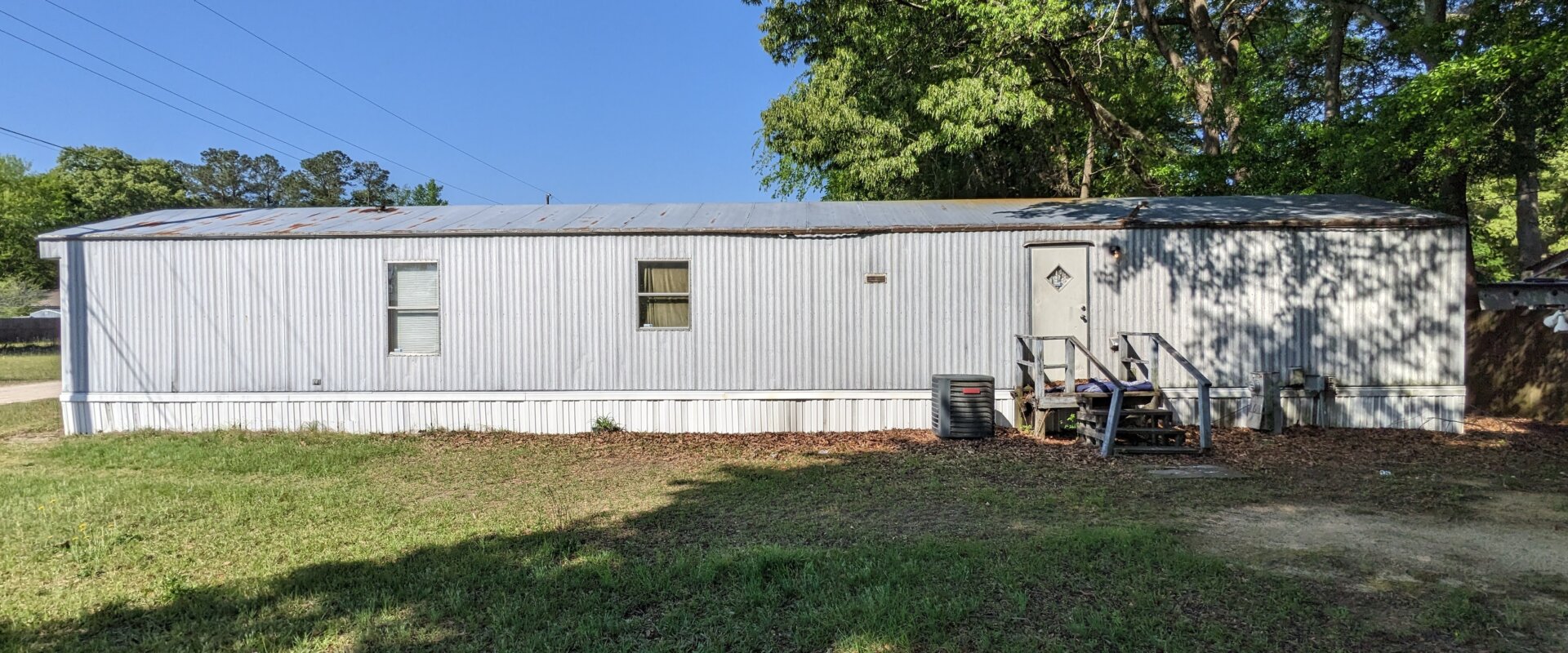Selling a mobile home during the probate process in North Carolina can feel daunting, especially when dealing with the emotional challenges of losing a loved one. You might wonder where to start, or how to handle all the legal details that come into play. Don’t worry— you’re not alone in this! Understanding the steps involved can empower you as an executor or administrator of the estate. From obtaining court approval to settling debts and getting your mobile home ready for sale, there are ways to make the process smoother. Let’s dive into some essential tips that will help you navigate through probate and successfully sell the mobile home.
To sell a mobile home in probate in North Carolina, you must first obtain the necessary legal authority, typically through the appointment of an executor or administrator by the court. Once authorized, you’ll need to provide pertinent documentation regarding the property, work with the court to settle any outstanding debts or taxes, and then you can list the mobile home for sale, ideally consulting with a seasoned local buyer like Logan Mobile Homes to expedite the process and ensure a smooth transaction.
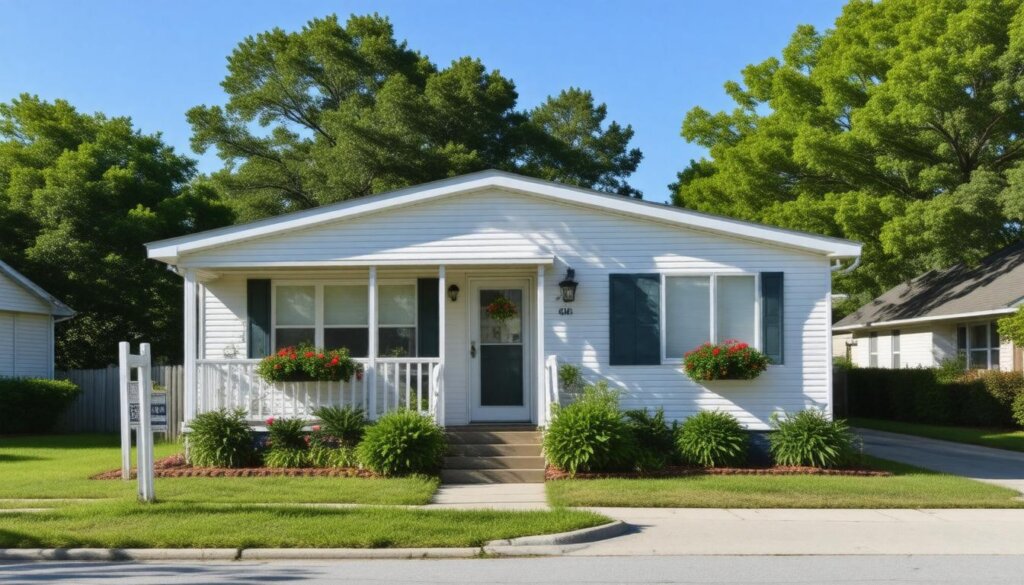
Overview of Probate in North Carolina
In essence, probate serves as a legal mechanism through which an individual’s estate—including any mobile homes—is managed and distributed after their passing. When this process begins in North Carolina, it starts with the validation of the will, if one exists. This means the court must confirm that the will reflects the deceased’s true wishes. If there is no will, state law dictates how assets will be divided, which can sometimes lead to disputes among family members.
The next significant step involves creating an inventory of all assets, which includes both real estate and personal property. For a mobile home seller, this is particularly pertinent because understanding what belongs to the estate will help determine what needs to be sold or transferred. It’s not simply about the physical structure; various belongings within the home may also have implications on what gets passed down or sold.
It’s helpful to keep in mind that selling a mobile home during probate isn’t just about getting rid of the property; it often intertwines with other legal obligations such as paying off any debts linked to the estate before heirs can receive their shares.
Once everything is accounted for, any outstanding liabilities—like loans or taxes—must be settled. This is essential for cleaning up the financial responsibilities so that heirs aren’t burdened by unexpected costs. Consequently, dealing with these concerns early in the probate process is critical. Failure to resolve debts could delay sales or complicate matters further down the line.
After settling liabilities, what remains is ready to be distributed to heirs according to either the directions laid out in the will or by state intestacy laws if there’s no will. It’s important for potential sellers to recognize that this step can sometimes drag out while parties negotiate their claims or if there are disputes regarding inheritances.
Having a clear understanding of each stage of the probate process prepares you not just for paperwork but equips you with insights for subsequent legal requirements related to selling your mobile home.
Legal Steps for Selling a Mobile Home in Probate
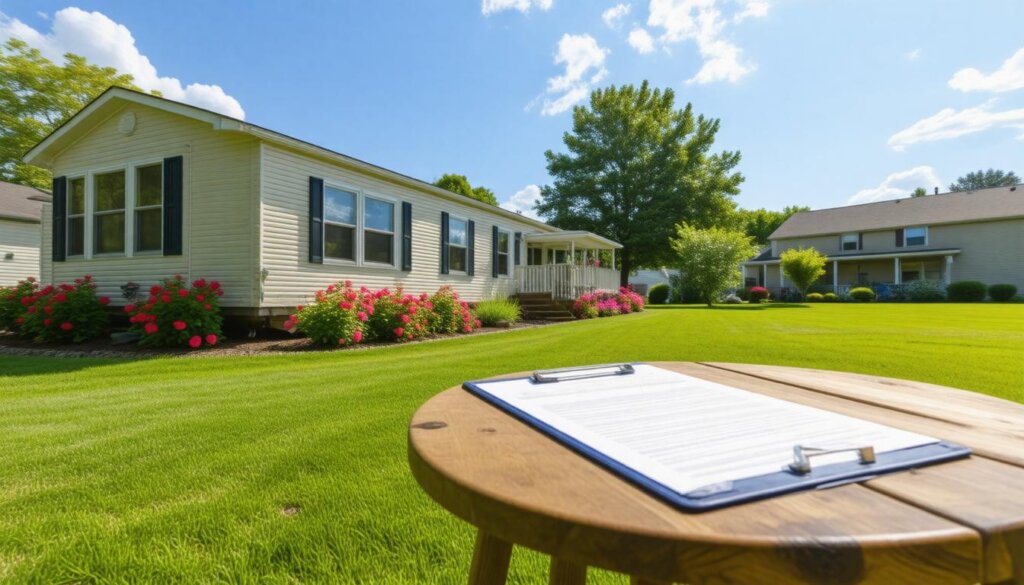
To navigate through the probate process effectively, you must adhere to specific legal protocols that safeguard both your interests and those of the estate. The first crucial step is to file a petition for probate with your local court. This officially establishes your role as the administrator or executor of the estate, granting you the legal authority to manage the assets, including the mobile home. Completion of this form isn’t just bureaucratic fluff; it sets off the wheels of justice and transparency, laying a firm foundation for all subsequent actions.
After securing this initial approval from the court, your next responsibility is to conduct an inventory and appraisal of all estate assets.
It’s essential to meticulously catalog every asset, listing not just the mobile home but any other belongings as well. By creating an accurate inventory, you convey a precise financial picture of what is at stake for the heirs involved. Depending on your situation, obtaining an official appraisal for the mobile home might be necessary. Appraisers will consider various factors—location, condition, and market trends—to estimate its value accurately. This valuation ensures transparency amongst beneficiaries while providing a critical benchmark for future sale negotiations.
With these details organized, it’s time to reach out to creditors.
In many instances, estates may come with outstanding debts or liens. Therefore, it’s necessary to publicly notify creditors about the probate proceedings. This is not just a formality; providing notice gives them a chance to claim any owed debts from the estate before proceeding with a sale. Think of it as clearing the air—by ensuring all debts are settled beforehand, you eliminate surprise claims that can complicate or stall your selling process down the line.
Following creditor notification, you will be preparing for the significant step of obtaining formal approval from the probate court to sell the mobile home.
Here’s where things get serious—from this point onward, everything hinges on legal compliance. Obtaining court approval means presenting your case to a judge or magistrate who will evaluate whether selling the mobile home serves the best interest of all heirs involved. The court may review documentation surrounding your appraisal and inquiry into potential offers. Effectively, they want assurance that you’re acting in good faith and that all parties will benefit from this transaction. Any objections raised by interested parties could delay this step, so thorough preparation is crucial.
Keep in mind that throughout this process, communication is paramount. Maintaining transparency with beneficiaries and interested parties can prevent disputes further along in the road.
These foundational steps significantly enhance your understanding of what lies ahead in handling estate matters efficiently.
Duties of the Executor or Administrator
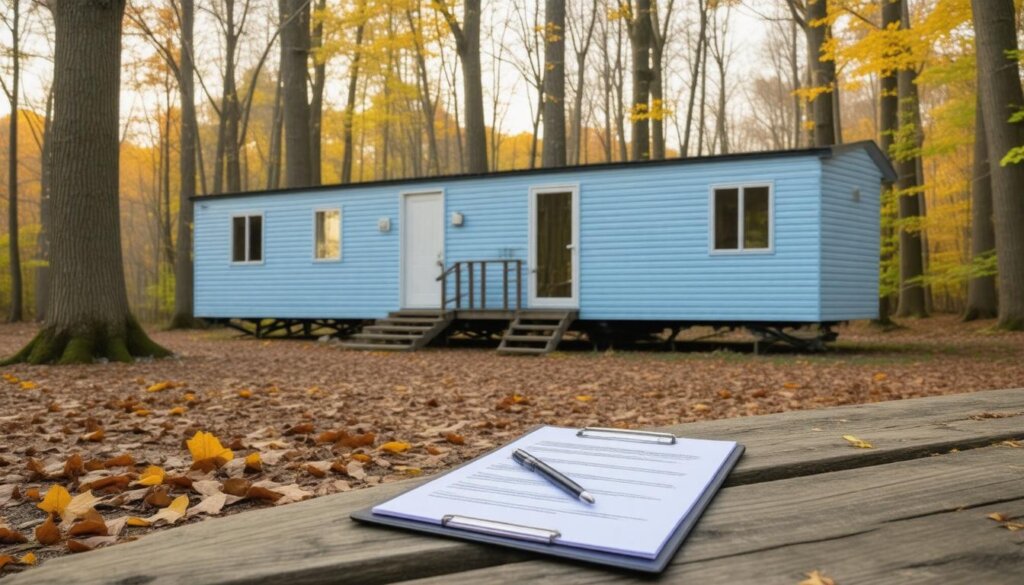
The executor or administrator plays a crucial role in managing the deceased’s estate, and their responsibilities require careful attention to detail. One of their primary duties is to identify and secure the assets left behind. This includes determining what property exists, such as the mobile home in question, and ensuring it’s adequately protected throughout the probate process. If there are keys needed for access or maintenance, these must be accounted for. This focus prevents any potential loss or damage to the property which could inadvertently devalue it.
After securing assets, the next critical responsibility falls to addressing any outstanding debts and taxes.
Paying off any debts and taxes owed by the deceased is essential before any distribution can take place. This often involves reviewing bank statements and financial records to ascertain what is owed. Once identified, settling these debts not only clears the estate’s liabilities but also smooths the path toward a more straightforward transaction when selling the mobile home. Unpaid debts could complicate matters down the line and potentially lead to legal ramifications for the heirs.
With debts settled, we can move on to the task of distributing remaining assets.
Following debt resolution, the executor is responsible for distributing the remaining assets according to either the will or North Carolina’s intestate succession laws if no will exists. A will typically outlines how estate assets should be distributed, simplifying this process. However, if no will was left behind, intestate laws dictate the hierarchy of heirs, generally favoring immediate relatives such as a spouse or children. Executors must ensure transparency throughout this process, clearly communicating with all involved parties to avoid potential disputes from misunderstandings.
“Maintaining clear lines of communication with heirs fosters trust and helps prevent conflicts.”
Throughout all these tasks, it is important for executors to document every step taken—keeping records of payments made, correspondence with heirs, and decisions regarding asset management. This not only satisfies legal requirements but also helps maintain clarity among stakeholders about actions being undertaken at each stage of probate.
Now that we have laid out these foundational duties of an executor or administrator, we can explore how to effectively determine a fair price that reflects the home’s value while also considering market conditions and other factors.
Setting the Right Price
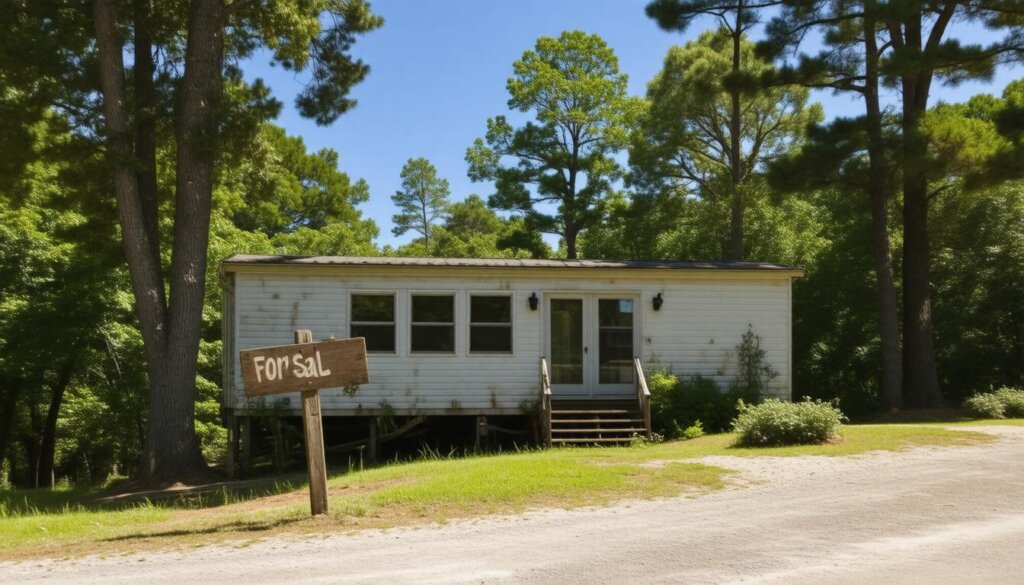
When pricing a mobile home, especially in probate, it’s crucial to grasp not just its market value but also the emotional weight of the situation. You might be dealing with an estate that holds memories and sentimental value, which adds an extra layer of complexity when determining a fair and marketable asking price. Your goal should be to strike a balance; that means setting a price that reflects both the property’s worth and attracts potential buyers.
Appraisal and Market Analysis
First things first, getting an appraisal can be incredibly helpful. This involves bringing in a professional appraiser who will consider various factors such as the home’s condition, location, and current real estate trends. They’ll provide a detailed valuation that’s indispensable for making informed decisions. Yes, hiring an appraiser might seem costly upfront, but it’s an investment that could save you from underselling your property or facing prolonged market time due to inflated pricing.
Additionally, conducting a Comparative Market Analysis (CMA) is equally important. This method allows you to compare your mobile home to similar properties that have recently sold within your area. Think of it like scouting out competitors before launching a product; you want insights into what similar homes are going for in order to remain competitive in the market. For example, if comparable homes in your neighborhood are listed at $60,000 and yours has similar characteristics but requires some repairs, you might consider pricing it slightly lower to attract more interest.
In North Carolina, the typical price range for mobile homes hovers between $40,000 and $100,000, depending on their size, age, location, and overall condition. Understanding this helps position your asking price optimally—set it too high and you risk deterring potential buyers; set it too low and you could lose out on valuable equity.
Remember: The right price isn’t just about numbers—it’s also about appealing to human emotions. Buyers often want to feel they are getting a good deal while still acknowledging value.
Take these factors seriously as you navigate pricing your mobile home in probate. Accurate assessment through appraisal and analysis ensures you’re well-equipped to make informed decisions in this important journey. With your price set correctly, the next step involves engaging potential buyers through effective approaches that resonate with them.
Marketing Strategies

To sell a mobile home successfully, you need to get as many eyes on it as possible. Utilizing diverse marketing channels expands your reach and taps into various potential buyers who might be interested in your property. Start by listing your mobile home on popular real estate websites like Zillow and Craigslist; these platforms attract a wide spectrum of buyers and can generate significant interest quickly.
In addition to online listings, consider social media platforms where visuals thrive, like Facebook or Instagram. These networks can provide an extra layer of exposure through targeted ads that reach local audiences actively looking for homes. But don’t stop there; leverage community-focused platforms such as Nextdoor. Your neighbors may know someone who’s in the market for a mobile home, creating a network effect that can speed up the sale process.
High-quality visuals are paramount in making your listing stand out. Investing time in professional photography can work wonders for how buyers perceive your mobile home. Crisp images highlighting its best features create an inviting first impression. Consider freshening up the space with simple decluttering and staging tips before the photo shoot; this allows prospective buyers to visualize themselves living in the home.
A virtual tour can add another dynamic element to your listing—it’s especially appealing for remote buyers who appreciate the convenience of viewing multiple properties without leaving their couch. This tool enhances engagement and gives buyers a comprehensive sense of the space, fostering genuine interest without requiring them to visit physically.
Beyond imagery, clear and descriptive language in your listing can help paint a vivid picture for potential buyers. Share details that resonate with your target audience: highlight features like outdoor space, updated appliances, or proximity to schools and parks—all elements that increase your home’s desirability.
As you implement these strategies, think about how each piece fits together into an overall marketing plan. Timing is essential; if your market tends to see greater sales during certain seasons or events—such as springtime when families move—you’ll want to launch your marketing efforts ahead of those trends.
Equipped with these marketing insights, you’re now ready to navigate the next essential steps that will facilitate a seamless transaction once genuine buyer interest begins to take shape.
Finalizing the Sale
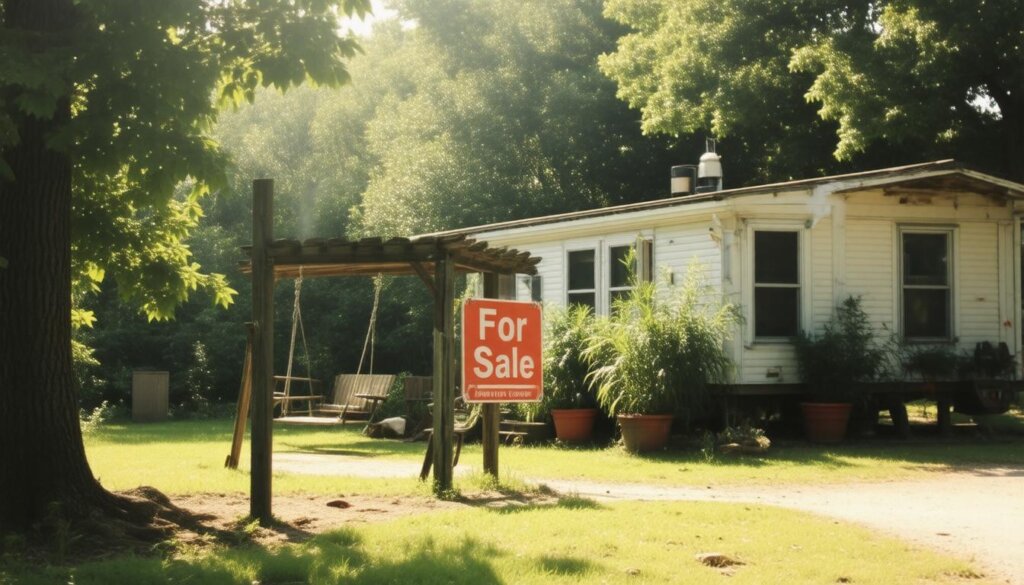
When selling a mobile home in probate, having the right documentation is imperative. First and foremost, you’ll need the deed of sale, which outlines the transfer of ownership from the estate to the buyer. Additionally, court approval is vital, confirming that all steps taken by the executor align with legal protocols. This often includes an official probate court order that authorizes the sale. Don’t forget any specific agreements you may have reached with the buyer; these should also be documented clearly to avoid misunderstandings later.
It’s wise to create a checklist of necessary documents before proceeding to finalize the sale. Having everything organized allows you to present an air of professionalism and can help alleviate stress for both you and potential buyers.
Closing Process
The closing process is where everything comes together; it’s critical that all parties involved sign the necessary documents. Think of it as choreographing a dance—everyone must move in sync, from signing agreements to transferring funds. One key aspect you’ll want to address is any remaining financial obligations associated with the property, such as paying off liens or taxes. Failing to manage these can lead to issues down the road, possibly complicating not only this sale but future transactions as well.
Closing also often involves providing the buyer with disclosures regarding any known issues with the home. Being upfront not only protects you legally but builds trust between you and your buyer.
While navigating these complexities can seem intimidating, enlisting the help of professionals can guide you through each step, allowing for a smoother transaction while focusing on essential decisions moving forward.
Legal and Professional Assistance

Navigating the complexities of probate can feel like a maze, with twists and turns that may seem overwhelming. Engaging an attorney who specializes in probate law is vital because they help you understand the intricate legal landscape and ensure that all paperwork is accurately completed. This legal backing becomes especially crucial if there are disputes among heirs. The right attorney can mediate these conversations, ensuring that everyone’s interests are respected and smoothing any rough edges before they escalate into significant conflicts.
But legal assistance isn’t the only professional support you might need.
Real estate agents experienced in probate sales offer invaluable market insights tailored to your situation. They understand local market trends and know how to price your mobile home competitively while attracting potential buyers. An experienced agent will provide guidance on effective marketing strategies that resonate with targeted buyers, helping highlight the unique features of your property while navigating any restrictions related to the probate process.
A satisfied client shared, “Working with professionals made selling the mobile home seamless and stress-free, saving us time and reducing our anxiety.” This speaks volumes about how essential professional assistance can be on this journey.
Ultimately, bringing in experts is not just a luxury; it’s a necessity that can save you both time and potential worry.
If you’re ready to sell your mobile home and want expert guidance throughout the probate selling process, contact Logan Mobile Homes today. Our dedicated team is here to support you every step of the way, ensuring that your journey is as smooth as possible. Visit our website at https://www.loganmobilehomes.com/ for more information.
How do you determine the value of a mobile house during probate?
To determine the value of a mobile house during probate in North Carolina, you should conduct a comparative market analysis (CMA) by looking at recent sales of similar mobile homes in the area, considering factors such as location, age, condition, and amenities. Additionally, hiring a certified appraiser can provide an objective valuation. On average, comparable sales can give insight into current market trends, with values fluctuating significantly; for instance, in 2023, mobile home prices in North Carolina ranged from $30,000 to over $100,000 depending on those variables. Remember that accurate valuation is crucial for equitable distribution among heirs.
Are there restrictions on who can purchase a mobile home being sold in probate?
Yes, there can be restrictions on who can purchase a mobile home sold in probate in North Carolina. Typically, probate sales are open to any interested buyer; however, potential limitations may arise based on the terms set forth by the court handling the probate process or requirements for specific types of lenders. Additionally, if the mobile home has covenants or is located in a community with rules about ownership, that could influence eligibility. Always consult legal guidelines and local regulations during such transactions to ensure compliance.
What documentation is required to sell a mobile house in probate?
To sell a mobile house in probate in North Carolina, you typically need a copy of the deceased’s will, a petition for probate, the letters testamentary or administration issued by the probate court, and any necessary tax documentation. It’s essential to confirm ownership and ensure that all liens are resolved, as mobile homes often have specific titling requirements. In 2022 alone, over 12% of estate sales involved mobile homes; thus, proper documentation is crucial for a smooth transaction.
What potential issues should sellers anticipate when trying to sell a mobile home in probate?
Sellers should anticipate several potential issues when selling a mobile home in probate, including legal complications related to title transfers and estate disputes among heirs. It’s crucial to ensure that the mobile home complies with local zoning laws and safety regulations, as many older models may not meet current standards. Additionally, emotional factors can arise if there are disagreements among family members about the sale or valuation of the property. According to data from the National Association of Realtors, properties sold in probate can take 10-20% longer to sell due to these complexities, highlighting the need for expert guidance throughout the process.
What specific probate laws in North Carolina affect the sale of mobile homes?
In North Carolina, the sale of a mobile home in probate is affected by laws governing the transfer of property titles and the handling of estates. Specifically, N.C. General Statutes § 28A-21 outlines the process for selling assets within an estate, which includes obtaining court approval or following instructions in the will. Additionally, mobile homes are considered personal property unless they are permanently affixed to real estate, requiring proper title transfer to ensure legal compliance. It’s crucial to work with an attorney familiar with both probate and real estate laws to navigate these requirements effectively, as improper handling can lead to disputes among heirs or financial penalties.
